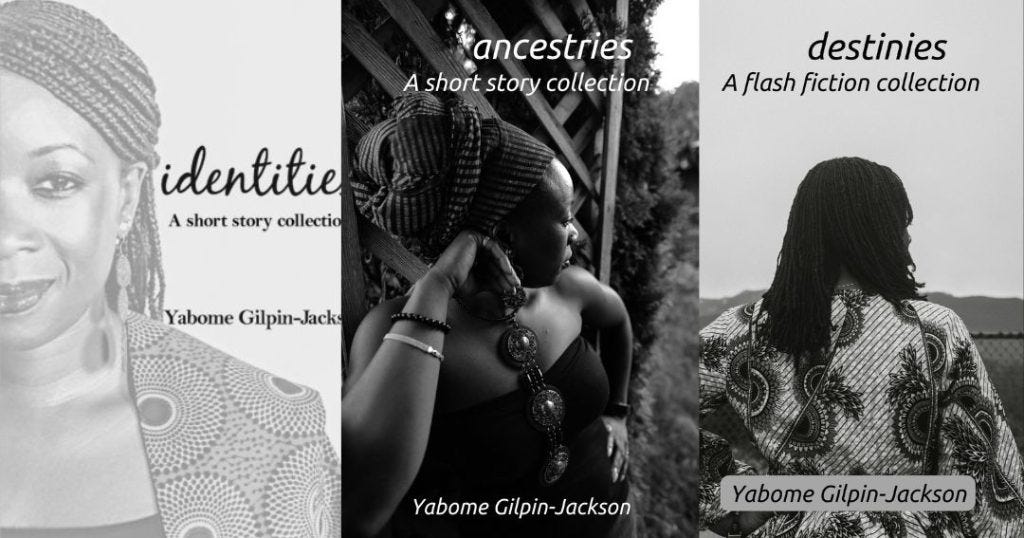Recap: Lessons from Black Women in leadership
ICYMI:
1. My short story collections and flash fiction book were all available to read for free on kindle in February. In case you missed it, you can get copies on Amazon and/or Indigo.
2. I’m running an Identities: Short Story Collection read along/book club. This collection features the lives and experiences of global African protagonists, navigating the experiences of bridging, balancing and weaving together their lives on and off the African continent. Register free here to join in reading together and for an opportunity for 2 zoom live sessions with me to discuss these stories.
3. Share/spread the word for my program for racialized women in leadership which starts in March. Registration now open through March 15.
The highlight of February for me was my annual conversation with Black Women Leaders. This year, I had the pleasure of moderating a conversation with panelists Angela Cassie, Bettyna Bélizaire, Christine Dikonguè and Dorothy Nyambi on Black Legacy and Leadership: Celebrating Canadian History and Uplifting Future Generations.
Across the conversation, these 4 themes emerged clearly. Here are some highlights.
The Need for Systems Change:
The panelists spoke about the reality of systemic challenges and biases in their experiences. From being the only Black person at leadership tables to the burden of representation and experiences of marginality that comes with that. However, they emphasized the need to get involved and stay involved, in order to make a systemic difference. Dorothy Nyambi emphasized this as the conversation concluded by saying: “there's just so much to do. Where I sit, I want to make sure that no matter what I do, I'm trying to address the issues that build a system that was not meant for us. I look at the system itself and I'm hoping that no matter what else I try to do, I'm doing one or two things that are at the systems level, whether it’s policy change or increasing representation so we actually have a voice and can change things.”
Prioritizing Holistic Health
The panelists had a profound conversation about the physical, emotional, financial, mental health and overall spirit-killing impacts that lead to the risk of burnout, illness and even early mortality rates among Black Women leaders. They advocated for Black Women leaders to take care of themselves, attending to the basics like good food, rest and exercise. Through the example of a Black woman physician who immediately recognized the impact of the stressors of public leadership roles on her health, Angela Cassie underscored the power of community and sisterhood as a fundamental part of health and sustaining the strength to lead. As she stated: “Too many black women who are dealing with physical issues like heart disease, like diabetes, are leaving us way too soon and we have to call that out and we need to find strategies and ways to do this in as healthy a way as possible because we want to be those ancestors. I want to see my grandchildren and my great grandchildren.”
Representation & Lifting Others Matters
All 4 panelists talked about the importance and power of representation. Each of them shared about being the first or only in their leadership roles, as well as a clear message that Black women must continue to show up everyday, because representation matters. They called us to lift each other up. A powerful example was shared through the life of Viola Desmond. Though she is now well recognized in Black Canadian history, her recognition was made possible by her sister Wanda Robson who worked hard to ensure Viola’s impact was documented. Wanda’s advocacy started with her writing a letter to request the story be highlighted. In addition, Carrie Best was a human rights activist who had experienced a similar discriminatory incident as Viola at the same theater and had become a newspaper founder. Carrie was instrumental in sharing Viola’s story. As Christine concluded, we need to support each other in every space to ensure our representation: “Be your girls’ girl! If you see someone doing something as opposed to feeling like: oh my God I want to do the same thing, then go to that person and help her accomplish that dream until you get to yours. I think we need to be each other's support system, it's very important especially when you're doing something that other women are not doing.”
The Power of Networks
A recurring theme was the power of networks in sustaining transformational leadership. Whether through mentorship, professional coalitions, or informal sisterhoods, each panelist credited their success to the support of a strong community. The leaders encouraged us to call on all the champions, networks, accomplices and mentors, within and beyond the Black community to engage in collective action to address human rights and equity concerns. We must stop trying to do everything on your own as one way to avoid burnout and also to scale impact. Bettina spoke powerfully about how much the power of the network, including networks beyond ourselves supported her as well as the immigrant women she serves to overcome systemic discrimination such as affinity biases that can keep new immigrants excluded from opportunities.
---
Overall, this conversation centered transformational leadership in the face of systemic challenges and was a reminder that incremental change does lead to transformational change.
Angela Cassie ended with this encouragement, quoting Maxine Waters:
I am a strong black women
I cannot be intimidated
I cannot be undermined
To the women out there
Do not allow dishonorable people to intimidate you or scare you
Be who you are
Do what you do
And let us get on discussing the real issues.
~~~
Watch the video recording of the conversation. The video notes share the long list of resources mentioned throughout the call so make sure to click 'more' below the video for those.





